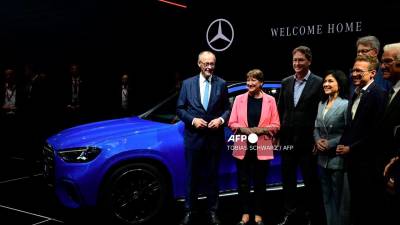BRUSSELS: Europe’s largest carmakers held crucial talks with European Commission President Ursula von der Leyen on Friday to pressure the bloc into revising its plan to end combustion-engine vehicle sales by 2035.
The industry is struggling with intense Chinese competition and a faltering transition to electric vehicles, prompting calls for a more pragmatic approach to climate targets.
European Automobile Manufacturers’ Association director Sigrid de Vries stated that current regulations are too rigid and must adapt to reality for success.
The European Commission confirmed discussions covered emission standards, competition, and proposals to boost electric vehicle adoption through business incentives.
EU spokeswoman Anna-Kaisa Itkonen emphasised the meeting aimed to provide industry input on future commission actions rather than just facilitate discussion.
Images released showed von der Leyen meeting with top executives from Renault, Stellantis, BMW Group, and Mercedes-Benz during the third round of talks under an EU initiative launched in January.
This sector employs 13 million people and contributes approximately seven percent of Europe’s GDP, making its transformation critically important.
Carmakers previously secured a reprieve on initial carbon emission targets but now seek more systemic changes to the 2035 deadline.
Industry leaders highlighted multiple challenges in an August letter to von der Leyen, including Asian battery dependency, high manufacturing costs, and new US tariffs set at 15%.
They noted that these obstacles, combined with uneven charging infrastructure, are limiting electric vehicle sales which currently represent only 15% of new car purchases.
Mercedes-Benz chief Ola Kaellenius and Schaeffler’s Matthias Zink described the transformation effort as operating with hands tied behind their backs.
They declared the 2035 target no longer feasible and called for tax breaks and incentives to stimulate electric vehicle demand.
Automakers also want greater acceptance of plug-in hybrids and efficient combustion engines to compete with Chinese rivals like BYD.
Green groups and electric vehicle companies oppose any weakening of the 2035 target, with over 150 organisations urging von der Leyen to stand firm.
Road transport generates about 20% of Europe’s planet-warming emissions, with 61% originating from car exhaust pipes.
Polestar CEO Michael Lohscheller argued that the 2035 deadline provides essential clarity for industry, investors, and consumers.
He warned that weakening the target would damage Europe’s competitive position in the global market.
Clean transport advocacy group T&E director William Todts pointed to new European electric vehicles unveiled at the Munich auto show as evidence that targets are working.
He noted that for the first time in a decade, German manufacturers are nearly matching Chinese quality, attributing this progress directly to CO2 standards.
Von der Leyen hinted at possible adjustments during a Wednesday speech, referencing technology neutrality and preparing for the 2035 review.
She announced plans for a small affordable cars initiative to create Europe’s own electric vehicle while repeating a pledge of 1.8 billion euros to boost battery production within the bloc. – AFP
